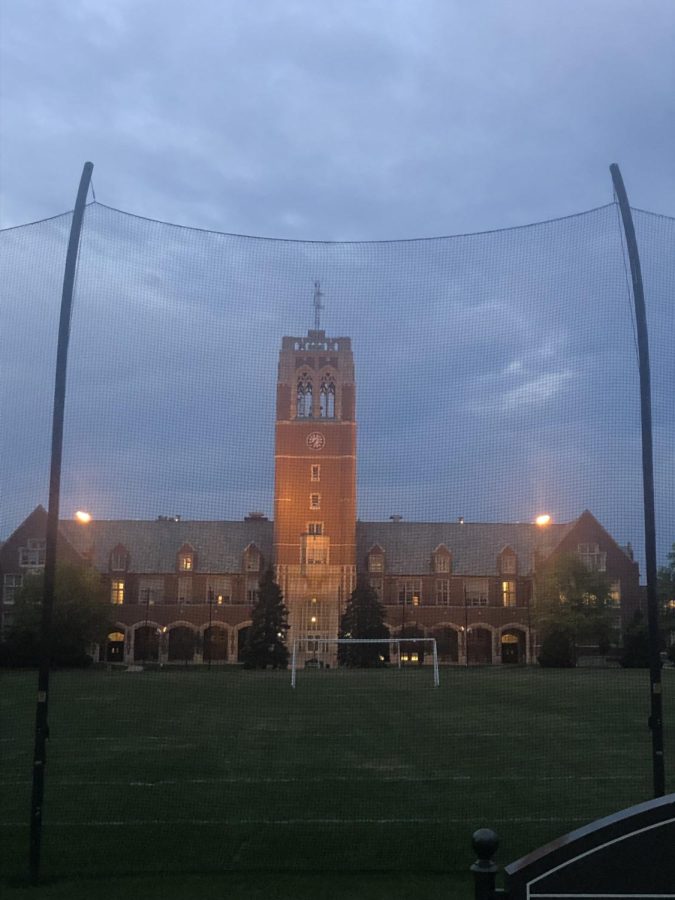Tenure a year later: how has JCU changed after the faculty handbook amendments?
“Over time, I worry that this will negatively impact the ability of JCU to attract and retain the quality of faculty that we have been accustomed to and that we will then lose our reputation for excellent teaching.”
Although a year has past since the announcement of the termination of two tenured faculty, the JCU community still ponders what its future will look like under these new circumstances
Oct 28, 2021
On Sept. 16, 2020, The Carroll News published an article about the termination of two tenured professors at JCU. Since this piece, John Carroll faced a myriad of challenges from conducting a semester fully on Zoom to enforcing a vaccine mandate. However, no issue has rallied the community like the weakening of tenure for faculty last year. Websites were created, lion statues were spray painted and the faculty and student groups united together to fight for the protection of tenure at JCU. Yet, it has been over a year since the initial tenure news broke. The question is: has anything changed?
With students fully back on campus for the first time since the start of the pandemic, talk of tenure has diminished since the spring. In March of 2021, five articles were published by The Carroll News; local and national news sources covered the state of affairs, and multiple petitions were circulated amongst the student body. Yet, since the commencement of the fall semester, it seems the matter has yet to resurface. Many freshmen do not even know of the situation.
“If it has something to do with the Honors Program losing its scholarship, then yes [I have heard of tenure],” Becca Abbott ‘25 told The Carroll News. “If not, then I have absolutely no clue.”
When asked about tenure, another freshman, Chloe Millard ‘25, said “no, actually I have not [heard of tenure]” and that most of her class “most likely [doesn’t] know” about the situation at hand.
No one has discussed tenure at JCU for many months. However, the skirmish rages on behind the scenes of the administration and faculty. Despite the lack of publicity, professors are still fighting for tenure.
“I have not seen or heard of anyone having different feelings now as compared to when this issue first arose during the pandemic,” Mark Waner, chemistry professor and faculty council chair, stated.
According to Waner, professor retention has possibly been impacted by tenure. Reportedly, one faculty member mentioned tenure in their recent resignation letter and two tenured faculty members were terminated with the nullification of the art history department. Waner also discussed that, if budgetary hardship were to be declared by the University, multiple faculty positions could be eliminated.
“At this time, no faculty members have been let go based on the new BOD’s (board of directors) amendments,” Waner continued. “It is important to note that the president and provost have both said they do not wish to have the BOD invoke the budgetary hardship resolution that could lead to tenured faculty elimination, and have worked to come up with plans that could avoid terminations.”
“We know that some faculty leave JCU each year, whether by way of retirement, finding other attractive employment in higher education or elsewhere or other reasons,” Waner continued. “It is hard to know for sure what role this has played in terms of faculty retention at this point.”
However, Waner expressed the anxiety of some faculty members over the long-term effect of weakening tenure. “I have never heard as much talk among faculty about looking for other jobs. Over time, I worry that this will negatively impact the ability of JCU to attract and retain the quality of faculty that we have been accustomed to and that we will then lose our reputation for excellent teaching.”
Provost and Academic Vice President Steven Herbert told The Carroll News that JCU faculty only have their positions threatened if budgetary hardship is declared by the John Carroll board and that, otherwise, “nothing has changed.”
Allegedly, tensions have been high between the faculty and the administration. Waner says the trust between the two parties has been “severely compromised,” stating that there is a lasting “sense of betrayal.” This has led to faculty obtaining legal counsel although no public legal actions have yet to be taken.
“Even in the best of times there is a natural tension between the administration and the faculty because of the differences in our charges,” Herbert stated. “This tension has certainly increased because of our disagreements on the amendment, and this is not unexpected or unusual. We are working with the faculty to address our disagreements as best we may.
“Faculty certainly objected to the amendment and made their displeasure known. Since that time, we’ve continued conversations. I would not say that we are closer to agreeing to a potential resolution but we are at a place of respectful disagreement and continue to talk.”
Students have also felt the impacts of tenure’s leave. The art history department provided many core classes for students that were well attended. According to statistics from U.S. News, JCU dropped from the third best school for undergraduate teaching to fourth and from the 16 ranked best value school to 22.
“There were a lot of rumors going around at the time and it was very difficult to decipher the truth about the situation, and to this day I still am confused about the nature of the decision,” Grace Kilfoyle ‘23, the JCU student government academic affairs chair, stated. “This was a decision made in the absence of true student input, which I think made many students feel isolated in the situation. Granted the faculty bear the direct burden of this situation, the lack of student and faculty input is concerning. I think it would be important to evaluate if our programs still have the same job placement rates and are still successfully competing in the ‘real world’ outside of our campus.”
The Carroll News reached out to the admissions department for more statistics but has not yet received a response.
“If I was not already at the school, I would not have come,” Abbott ‘25 stated after learning about tenure and its impacts.
“When it comes to the tenure situation at JCU, I was very disappointed in the administration for taking away a teacher’s employment protections especially when they worked so hard to earn it,” Selena Alamir ‘24 stated. “When the board eliminated tenure protections, many great professors were lost… JCU lowered the standards in order to get rid of individual professors, and I have a big issue with this as a student because that impacts the quality of education I receive here.”
Waner reiterated the lasting disappointment of many faculty members, as well.
“Speaking for myself and colleagues I have heard from, this is a very hurtful time at JCU,” Waner said. “Tenured and tenure-track faculty have been working under the contract and rules for earning and maintaining tenure that existed at the time they were hired and confirmed at the time that tenure was granted. Tenure is a commitment made by both the faculty member and the institution. Even if the tenure issue is resolved, it will take time and a great deal of effort to rebuild some level of trust.”
While some professors worry about their occupational safety in the face of weakened tenure, the administration emphasized it’s high hopes for the future of JCU.
“John Carroll is in a stronger position than most other institutions with a great educational experience, an extremely talented and dedicated faculty, and the resources necessary to address our challenges boldly and innovatively,” Herbert said. “I think our future looks bright, though we must continue to work hard to make it come to be.”
It remains uncertain what will happen next regarding tenure. However, it is clear neither the faculty or the administration seems to be budging on their position anytime soon. For the foreseeable future, tenure and employee rights at JCU will continue to be a hot-button issue.
















Carrie Buchanan • Oct 30, 2021 at 1:25 am
Well done, Laken! Thanks for the update.